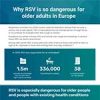Context
RSV is a common respiratory virus that can cause serious illness in young children and some groups of adults, including older adults and those with certain underlying health conditions. But the impact of RSV on adults is often underestimated, leading to inadequate prevention and management.
RSV is a common cause of lower respiratory tract infections around the world. It is often misunderstood to be only a childhood illness, even by healthcare professionals. This may be because in healthy adults, RSV typically causes mild symptoms that are indistinguishable from those of other common respiratory infections, such as the common cold. However, in older adults and those with underlying health conditions, RSV can cause a severe infection, such as pneumonia. It can result in hospitalisation and may have a higher mortality rate than flu.
Before the COVID-19 pandemic, RSV was estimated to account for one in ten acute respiratory episodes in adults in Europe. Virus control measures put in place during the pandemic are thought to have affected the seasonal pattern and spread of RSV, and we have recently seen unusual spikes in RSV infections that have put considerable extra pressure on health systems. However, the chronic under-reporting of RSV infections, and the inconsistent and often insufficient data collection and surveillance in Europe, mean that the burden of the disease is unclear and likely to be underestimated.
As a result of low awareness and inadequate surveillance, many adults at risk of severe disease may not benefit from key preventive measures. Currently, prevention in adults depends on virus control measures, such as hand-washing, personal protective equipment and isolation within healthcare settings. But the implementation of these strategies is reliant on adequate awareness among healthcare professionals and the public. When an adult RSV vaccine becomes available – which is expected to occur in the near to medium term – awareness, data collection and surveillance will become even more important in guiding the implementation of new vaccination programmes.


